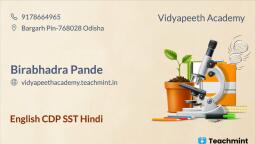Question 1 :
<b>Read the following poem carefully and answer the questions that follow by selecting the most appropriate option.</b> <br> Four seasons fill the measure of the year <br> There are four seasons in the mind of man <br> He has his lusty-Spring, when fancy clear <br> Takes in all beauty with an easy span. <br> <br> He has his summer when luxuriously <br> Spring’s honey’d cud of youthful thought he loves <br> To ruminate and by such dreaming high <br> Is nearest unto heaven, quiet coves <br> <br> His soul has in its autumn, when his wings <br> He furleth close; contented so to look <br> on mists in idleness – to let fair things <br> Pass by unheeded as a threshold brook. <br> He has his winter too of pale misfeature <br> or else he would forego his mortal nature. <br>“Pass by unheeded as a threshold brook” identify the figure of speech in this sentence
Question 4 :
When young learners are taught to improve their spelling and punctuation, they will
Question 5 :
<b> Read the following passage carefully and answer the questions that follow by selecting the most appropriate option.</b> <br> Our body is a wondrous mechanism and when subjected to unusual stress over a period of time, it adapts itself to deal more effectively with that stress. Therefore, when you exert your muscles against resistance, they are forced to adapt and deal with this extraordinary workload. This is the principle of weight training. Strands of muscle fibres become thicker and stronger in response to the demands placed on them. <br> One of the great merits of weight training is the strength of your heart. During weight training, your heart is forced to beat faster and stronger in order to pump sufficient blood to the muscles being worked. In time, your heart, like your body, will adapt to this extra-workload by becoming stronger and more efficient. Since, your body needs a given amount of blood to perform its daily tasks, your heart will now need fewer beasts to pump the same quantity of blood. Sounds good? There’s more. Your entire circulatory system is given a thorough workout every time you exercise, which increases its overall efficiency. Even the neural paths from your brain’s command centres to each individual muscle become more effective, enabling easier recruitment of muscle fibres for carrying out physical tasks. In essence, your body becomes a well-oiled and finely-tuned piece of machinery, whirring along without any breakdown. In today’s stress-filled world, you need all the help you can get. <br>What does the term ‘well-oiled’ in the passage denote?
Question 7 :
<b> Read the following passage carefully and choose the most appropriate answer to the question out of the four alternatives. </b> <br> An old shepherd was playing a flute on the marshlands outside Rome. He played so sweetly that a lovely fairy came and listened to him. <br> “Will you marry me, and play to me in my castle?” she said. <br> “Yes, yes, lovely lady!” said the shepherd. <br> The fairy put a ring on his finger. At once he became a handsome young man dressed in princely robes. “But I must first go to Rome and bid farewell to my friends”, he said. <br> The fairy gave him a golden coach with twelve white horses. As he rode in State to Rome, he met the young Queen of Italy, who invited him to her palace. <br> The shepherd saw that he had won the Queen’s heart. He resolved to marry her and become the King of Italy and let the fairy go. So when he and the Queen were alone together he knelt down and took her hand, saying: <br> “Marry me, dearest and I will help you to govern Italy.” <br> But at soon as he spoke he turned into an old and rugged shepherd. <br> “What is this horrible beggar doing here?” cried the Queen. “Whip him out of the palace.” <br>The Queen ordered the shepherd to be whipped out of the palace because he
Question 8 :
<b> Read the following passage carefully and answer the questions</b> <br> <b>that follow by selecting the most appropriate option.</b> <br> <br> Nammescong Creek flowed into the backs of my thighs as I fished, pausing between casts to secure my balance in the current and admire a new hatch of pale yellow mayflies lift from the stream. Over my shoulder, the sun dropped into a farmer's cornfield, the final patch of orange light on the water enough for me to spot the small, vaguely metallic object at my feet. Retrieving it, I ran my thumb over its raised lettering, rubbing away the mud and a string of algae. A name appeared, along with an expiration date. June 1984. I had discovered arrowheads here in the past, so it didn't seem misplaced to find a tool used by modem man to obtain a meal. <br> I took a moment to consider how the card had come to rest in the bed of the Nammy. I thought maybe there was a story in it. I was curious to know if the owner had lost his wallet while fishing, the whole trip ruined the second he'd inventoried his cash or dug out his license for a game warden. Over time the leather would've rotted into fish food, with the scoured plastic remaining I wondered how many miles the card might have ridden on spring floods over the past quarter of a century. For all I knew he could've been robbed, the thieves stripping out the money and tossing the billfold away later as they crossed a bridge. <br> Looking him up and phoning. I recited the card number and issuing bank. He laughed, recalling it as the first, credit account he'd ever taken out, a line of imaginary cash in those years when he had no real money. But that finally changed, he explained, after an industrial accident cost him his left eye, the payoff from the plant enabling him to retire eight years earlier than expected and move to a small hobby farm in southern Virginia. He told me a glass eye wasn't his style, so he had taken to wearing an eyepatch which his wife still hates and his grandchildren — ages three, five, and seven — have always loved, as it makes Grandpop look like a pirate. He called them his Miracle Grandbabies, born to a daughter who struggled with alcohol and drug addiction for years — her rock-bottom in 1984, a year before she cleaned up for good. <br> But in the end the man couldn't remember ever losing his wallet, either by accident or theft. He said he'd never fished the Nammy that, in fact, he'd always thought the sport a little boring, and so I came to realize there was no story here. <br> <br>"tool used by modem man to obtain a meal" in this context is a/some
Question 9 :
“You ask, what is our aim? I can answer in one word: Victory.” Churchill asks a question and then goes on to answer it. Such question is
Question 10 :
Error correction in students’ written work in most effective when the teacher
Question 13 :
Instead of asking questions and getting answers from her learner’s, a teacher give some short texts and asks her learners to frame questions. Her primary objective is to
Question 14 :
When a teacher uses lesson in Science and Social Science to teach language, such an approach can be termed as
Question 15 :
<b> Read the following passage carefully and answer the questions that follow by selecting the most appropriate option.</b> <br> <br> Anaesthesia in any part of the body means a loss of sensation, either permanent or temporary. The term is usually used to describe the artificially produced loss of sensation which makes a surgical operation painless. <br> There are four main types of anaesthesia : general, spinal, regional, and local. Anaesthetics may be given as gases, by inhalation; or as drugs injected into a vein. A patient given general anaesthesia loses consciousness. Anaesthsia of a fairly large area of the body results from injecting the anaesthetic drug into the spinal canal : all that portion of the body below the level at which the drug is injected is anaesthetized. Regional anaesthesia is the injecting of the nerves as they emerge from the spinal column : the anaesthesia induced by this method affects only that area of the body supplied by those nerves. In local anaesthesia, the drug is injected directly at the site of the operative incision and sometimes also into the nearby surrounding tissues. Formerly the most commonly used local anaesthetic was cocaine, a drug extracted from the leaves of the coca bush and introduced in 1879. But cocaine has some disadvantages and, sometimes, undesirable side-effects. For spinal, regional and local anaesthesia, procaine, or one of the several modifications of procaine, is now widely used instead of cocaine. For very limited and short operations, such as opening a small abscess, local anaesthesia may be induced by spraying (rather than injecting) a chemical, ethyl chloride, on a small area of the skin; in changing from the liquid to the gaseous state, this drug freezes the area sprayed, and permits painless incision. <br> <br>“Anaesthetic' is
Question 16 :
<b> Read the following poem carefully and answer the questions that follow by selecting the most appropriate option.</b> <br> <br> Go hang yourself, you old M.D.! <br> You shall not sneer at me. <br> Pick up your hat and stethoscope, <br> Go wash your mouth with laundry soap; <br> I contemplate a joy exquisite I’m not paying you for your visit. <br> I did not call you to be told <br> My malady is a common cold. <br> By pounding brow and swollen lip; <br> By fever’s hot and scaly grip; <br> By those two red redundant eyes <br> That weep like woeful April skies; <br> By racking snuffle, snort, and sniff; <br> By handkerchief after handkerchief; <br> This cold you wave away as naught <br> Is the damnedest cold man ever caught! <br> Bacilli swarm within my portals <br> Such as were ne’er conceived by mortals, <br> But bred by scientists wise and hoary <br> In some Olympic laboratory; <br> Bacteria as large as mice, <br> With feet of fire and heads of ice <br> Who never interrupt for slumber <br> Their stamping elephantine rumba. <br> <br>‘Bacteria as large as mice’ is an instance of a/an
Question 17 :
<b>Read the following passage carefully and answer the questions that follow by selecting the most appropriate option.</b> <br> <br> Nothing succeeds like success, is an old saying and it is very true. Once you are successful and established, no matter what your formula to success it gets accepted and recognized as worthy of emulation. I meet many parents whose children say that they need not continue with their college studies, quoting the example of bill Gates who dropped out of Harvard and became the world’s richest person. But these children do not see the other great virtues that propelled Gates to invent ‘Windows’ and succeed. Without these, the chances of replicating Gates by merely dropping out of the system to be successful is as much as that of finding snowflakes in Sahara. <br> It is the same perception that pervades the minds of many people that being successful is an end in itself. Not true at all. I have read many articles by very successful people an seen life to realise that holding on to success is often more difficult than being successful. Ask many of our cricketers who have had success get to their heads or have had to battle indifferent form. Ask the superstars who became rich, successful and led troubled lives, became bankrupt and died young. And that long list begins with Micheel Jackson and includes Amy Winehouse and goes a long way to Marilyn Monroe. <br> <br>A suitable title for this passage would be ____________.
Question 18 :
Identify the question that assesses student’s ability to infer the meaning of the text.
Question 20 :
While learning vocabulary, learners connect one word with its related words and the words which can occur before and after it. What is this technique called?
Question 21 :
<b> Read the following poem carefully and answer the questions that follow by selecting the most appropriate option.</b> <br> I wander’d lonely as a cloud <br> That floats on high o’er vales and hills. <br> When all at once I saw a crowd. <br> A host, of golden daffodils; <br> Beside the lake, beneath the trees, <br> Fluttering and dancing in the breeze. <br> Continuous as the stars that shine <br> And twinkle on the Milky Way, <br> They stretch’d in never-ending line <br> Along the margin of a bay: <br> Ten thousand saw I at a glance, <br> Tossing their heads in sprightly dance. <br> The waves beside them danced; but they <br> Out-did the sparkling waves in glee: <br> A poet could not but be gay, <br> In such a jocund company: <br> I gazed – and gazed – but little thought <br> What wealth the show to me had brought: <br> For oft, when on my couch I lie <br> In vacant or in pensive mood, <br> They flash upon that inward eye <br> Which is the bliss of solitude; <br> And then my heart with pleasure fills, <br> And dances with the daffodils. <br>The daffodils
Question 23 :
Scanning means darting over much of a text to search for
Question 25 :
<b> Read the following poem carefully and answer the questions that follow by selecting the most appropriate option.</b> <br> I wander’d lonely as a cloud <br> That floats on high o’er vales and hills. <br> When all at once I saw a crowd. <br> A host, of golden daffodils; <br> Beside the lake, beneath the trees, <br> Fluttering and dancing in the breeze. <br> Continuous as the stars that shine <br> And twinkle on the Milky Way, <br> They stretch’d in never-ending line <br> Along the margin of a bay: <br> Ten thousand saw I at a glance, <br> Tossing their heads in sprightly dance. <br> The waves beside them danced; but they <br> Out-did the sparkling waves in glee: <br> A poet could not but be gay, <br> In such a jocund company: <br> I gazed – and gazed – but little thought <br> What wealth the show to me had brought: <br> For oft, when on my couch I lie <br> In vacant or in pensive mood, <br> They flash upon that inward eye <br> Which is the bliss of solitude; <br> And then my heart with pleasure fills, <br> And dances with the daffodils. <br>“Continuous as the stars that shine And twinkle on the milky way: What is the figure of speech used here?
Question 26 :
<b>Read the following passage carefully and choose the most appropriate answer to the question out of the four alternatives.</b> <br> The third defect of our civilization is that it does not know what to do with its knowledge. Science has given us powers fit for the gods, yet we use them like small children. For example, we do not know how to manage our machines. Machines were made to be man’s servants; yet he has grown so dependent on them/that they are in a fair way to become his masters. Already most men spend most of their lives looking after and waiting upon machines. And the machines are very stern masters. They must be fed with coal, and given petrol to drink, and oil to wash with and they must be kept at the right temperature. And if they do not get their meals when they expect them, they grow sulky and refuse to work, or burst with rage, and blow up, and spread ruin and destruction all around them. So we have to wait upon them very attentively and do all that we can to keep them in a good temper. Already we find it difficult either to work or play without the machines, and a time may come when they rule us altogether, just as we rule animals. And this brings me to the point at which I asked, “What do we do with all the time which the machines have saved for us, and the new energy that they have given us?” On, the whole, it must be admitted, we do very little. For the most part we use our time and energy to make more and better machines; but more and better machines will only give us still more time and more energy, and what we do with them? The answer I think, is that we should try to become more civilized. For the machines themselves, and the power which machines have given us, are not civilization but aids to civilization. <br>What were the machines made for?
Question 27 :
There are 44 sounds in English. Out of these, how many sounds consonants respectively?
Question 28 :
“You ask, what is our aim? I can answer in one word: Victory.” Churchill asks a question and then goes on to answer it. Such question is
Question 29 :
To make assessment a ‘useful and interesting process, one should be careful about?
Question 30 :
Which of the following will help learners take greater responsibility for their own learner?
Question 31 :
<b> Read the following passage carefully and answer the questions</b> <br> <b>that follow by selecting the most appropriate option.</b> <br> The public distribution system, which provides food at low prices, is a subject of vital concern. There is a growing realization that though India has enough food to feed its masses two square meals a day, the monster of starvation and food insecurity continues to haunt the poor in our country. <br> Increasing the purchasing power of the poor through providing productive employment leading to rising income, and thus good standard of living is the ultimate objective of public policy. However, till then, there is a need to provide assured supply of good through a restructured, more efficient and decentralized public distribution system (PDS). Although the PDS is extensive it is one of the largest such systems in the world - it has not reached the rural poor and the remote places. It remains an urban phenomenon, with the majority of the rural poor still out of its reach due to lack of economic and physical access. The poorest in the cities and the migrants are left out, for they generally do not possess ration cards. The allocation of PDS supplies in big cities is larger than in rural areas. In view of such deficiencies in the system, the PDS urgently needs to be streamlined. Also, considering the large food grains production combined with food subsidy on one hand and the continuing slow starvation and dismal poverty of rural population on the other, there is a strong case for making PDS target group oriented. By making PDS target group oriented, not only the poorest and the neediest would be reached without additional cost but we can also reduce the overall costs incurred. <br>Which of the following is true of public distribution system?
Question 32 :
When a test item expects the learners to use tense forms, voice, connectors, prepositions and articles accurately, such an approach can be called
Question 33 :
One of the main objectives of Continuous and Comprehensive Evaluations is
Question 34 :
<b> Read the following poem carefully and answer the questions that follow by selecting the most appropriate option.</b> <br> Weavers, weaving at break of day, <br> Why do you weave a garment so say? <br> Blue as the wing of a bluebird wild, <br> We weave the robes of a new-born child. <br> Weavers, weaving at fall of night, <br> Why do you weave a garment so bright? <br> Like the plumes of a peacock, purple & green, <br> We weave the marriage-veils of a queen. <br> Weavers, weaving solemn and still, <br> What do you weave in the moonlight chill? <br> White as a feather and white as a cloud, <br> We weave a dead man’s funeral shroud. <br>What do the weavers weave in the early morning?
Question 37 :
The stories is good for beginner readers. This an error of
Question 39 :
<b> Read the following passage carefully and answer the questions</b> <br> <b>that follow by selecting the most appropriate option.</b> <br> <br> Nammescong Creek flowed into the backs of my thighs as I fished, pausing between casts to secure my balance in the current and admire a new hatch of pale yellow mayflies lift from the stream. Over my shoulder, the sun dropped into a farmer's cornfield, the final patch of orange light on the water enough for me to spot the small, vaguely metallic object at my feet. Retrieving it, I ran my thumb over its raised lettering, rubbing away the mud and a string of algae. A name appeared, along with an expiration date. June 1984. I had discovered arrowheads here in the past, so it didn't seem misplaced to find a tool used by modem man to obtain a meal. <br> I took a moment to consider how the card had come to rest in the bed of the Nammy. I thought maybe there was a story in it. I was curious to know if the owner had lost his wallet while fishing, the whole trip ruined the second he'd inventoried his cash or dug out his license for a game warden. Over time the leather would've rotted into fish food, with the scoured plastic remaining I wondered how many miles the card might have ridden on spring floods over the past quarter of a century. For all I knew he could've been robbed, the thieves stripping out the money and tossing the billfold away later as they crossed a bridge. <br> Looking him up and phoning. I recited the card number and issuing bank. He laughed, recalling it as the first, credit account he'd ever taken out, a line of imaginary cash in those years when he had no real money. But that finally changed, he explained, after an industrial accident cost him his left eye, the payoff from the plant enabling him to retire eight years earlier than expected and move to a small hobby farm in southern Virginia. He told me a glass eye wasn't his style, so he had taken to wearing an eyepatch which his wife still hates and his grandchildren — ages three, five, and seven — have always loved, as it makes Grandpop look like a pirate. He called them his Miracle Grandbabies, born to a daughter who struggled with alcohol and drug addiction for years — her rock-bottom in 1984, a year before she cleaned up for good. <br> But in the end the man couldn't remember ever losing his wallet, either by accident or theft. He said he'd never fished the Nammy that, in fact, he'd always thought the sport a little boring, and so I came to realize there was no story here. <br> <br>A word in the story that means 'soar' is
Question 40 :
<b> Read the following poem carefully and answer the questions that follow by </b> <br> <b>selecting the most appropriate option.</b> <br> T' was the night before Christmas, <br> And all through the kitchen, <br> My mother was cooking some delicious chicken. <br> All of the sudden, <br> the light bulb broke, <br> And my mother randomly started to choke, <br> In a flash, Superman came. <br> My brother thought his costume was lame. <br> And instead of rescuing the day, <br> He ate up my dinner, <br> And he flew away <br> Santa burnt the house with dynamite and flares, <br> I guess I was on the naughty list, next year, I'll care! <br>The word instant can replace which of these words from the poem?
Question 41 :
<b> Read the following poem carefully and answer the questions that follow by </b> <br> <b>selecting the most appropriate option.</b> <br> T' was the night before Christmas, <br> And all through the kitchen, <br> My mother was cooking some delicious chicken. <br> All of the sudden, <br> the light bulb broke, <br> And my mother randomly started to choke, <br> In a flash, Superman came. <br> My brother thought his costume was lame. <br> And instead of rescuing the day, <br> He ate up my dinner, <br> And he flew away <br> Santa burnt the house with dynamite and flares, <br> I guess I was on the naughty list, next year, I'll care! <br>The night before Christmas is also spoken of as
Question 42 :
<b>Read the following passage carefully and choose the most appropriate answer to the question out of the four alternatives.</b> <br> <br> A guest speaker was addressing the faculty and the students in the college auditorium. I had joined the faculty the year before, and was already drawing attention. I was 27, full of assumptions about myself, quick with a comment on everything, and expected people to pay attention to all that I had said. <br> I listened to the talk for the first five minutes. By the seventh, I was looking around to check if others were listening. By the tenth, I had glanced at my watch three times, and yawned once. After twenty minutes I was thoroughly bored, and telling myself that it was difficult to sit through such an insipid talk. I wanted to share some of my expert comments with my neighbor. But he was completely sold out to the speaker, and looked like it was the greatest day of his life. I was disgusted. I tried to catch a word or phrase from the talk, only to convince myself that this should be his last talk ever. <br> The one-hour talk took ages to end, and before the thanks were said, I jumped to my feet with a sigh of relief. My neighbor smiled at me and said, "The talk was wonderful, wasn't it?" I retorted, "It almost killed me with kindness". <br> <br>How long did the narrator listen to the speech without judgement?
Question 43 :
<b>Read the following passage carefully and choose the most appropriate answer to the question out of the four alternatives.</b> <br> <br> A guest speaker was addressing the faculty and the students in the college auditorium. I had joined the faculty the year before, and was already drawing attention. I was 27, full of assumptions about myself, quick with a comment on everything, and expected people to pay attention to all that I had said. <br> I listened to the talk for the first five minutes. By the seventh, I was looking around to check if others were listening. By the tenth, I had glanced at my watch three times, and yawned once. After twenty minutes I was thoroughly bored, and telling myself that it was difficult to sit through such an insipid talk. I wanted to share some of my expert comments with my neighbor. But he was completely sold out to the speaker, and looked like it was the greatest day of his life. I was disgusted. I tried to catch a word or phrase from the talk, only to convince myself that this should be his last talk ever. <br> The one-hour talk took ages to end, and before the thanks were said, I jumped to my feet with a sigh of relief. My neighbor smiled at me and said, "The talk was wonderful, wasn't it?" I retorted, "It almost killed me with kindness". <br> <br>The narrator was disgusted because
Question 44 :
<b>Read the following passage carefully and choose the most appropriate answer to the question out of the four alternatives.</b> <br> <br> Learning is the knowledge of that which is not generally known to others, and which we can only derive at second-hand from books or other artificial sources. The knowledge of that which is before us, or about us, which appeals to our experience, passions, and pursuits, to the bosoms and businesses of men, is not learning. Learning is the knowledge of that which none but the learned know. He is the most learned man who knows the most of what is farthest removed from common life and actual observation. The learned man prides himself in the knowledge of names, and dates, not of men or things. He thinks and cares nothing about his next-door neighbours, but he is deeply read in the tribes and castes of the Hindoos and Calmuc Tartars. He can hardly find his way into the next street, though he is acquainted with the exact dimensions of Constantinople and Peking. He does not know whether his oldest acquaintance is a knave or a fool, but he can pronounce a pompous lecture on all the principal characters in history. He cannot tell whether an object is black or white, round or square, and yet he is a professed master of the optics and the rules of perspective. <br> <br>The passage suggests that a learned man
Question 45 :
<b> Read the following poem carefully and answer the questions that follow by selecting the most appropriate option.</b> <br> Weavers, weaving at break of day, <br> Why do you weave a garment so say? <br> Blue as the wing of a bluebird wild, <br> We weave the robes of a new-born child. <br> Weavers, weaving at fall of night, <br> Why do you weave a garment so bright? <br> Like the plumes of a peacock, purple & green, <br> We weave the marriage-veils of a queen. <br> Weavers, weaving solemn and still, <br> What do you weave in the moonlight chill? <br> White as a feather and white as a cloud, <br> We weave a dead man’s funeral shroud. <br>The three stages of life mentioned in the poem are __________.
Question 46 :
<b> Read the following passage carefully and choose the most appropriate answer to the question out of the four alternatives. </b> <br> An old shepherd was playing a flute on the marshlands outside Rome. He played so sweetly that a lovely fairy came and listened to him. <br> “Will you marry me, and play to me in my castle?” she said. <br> “Yes, yes, lovely lady!” said the shepherd. <br> The fairy put a ring on his finger. At once he became a handsome young man dressed in princely robes. “But I must first go to Rome and bid farewell to my friends”, he said. <br> The fairy gave him a golden coach with twelve white horses. As he rode in State to Rome, he met the young Queen of Italy, who invited him to her palace. <br> The shepherd saw that he had won the Queen’s heart. He resolved to marry her and become the King of Italy and let the fairy go. So when he and the Queen were alone together he knelt down and took her hand, saying: <br> “Marry me, dearest and I will help you to govern Italy.” <br> But at soon as he spoke he turned into an old and rugged shepherd. <br> “What is this horrible beggar doing here?” cried the Queen. “Whip him out of the palace.” <br>When the shepherd reached Rome, he
Question 48 :
<b>Read the following passage carefully and choose the most appropriate answer to the question out of the four alternatives.</b> <br> The Bengal Renaissance refers to a social reform movement during the nineteenth and early twentieth centuries in the region of Bengal in Undivided India during the period of British rule. The Bengal renaissance can be said to have started with Raja Ram Mohan Roy (1775-1833) and ended with Rabindranath Tagore (1861-1941) although there have been many stalwarts thereafter embodying particular aspects of the unique intellectual and creative output. Nineteenth century Bengal was a unique blend of religious and social reformers, scholars, literary giants, journalists, patriotic orators and scientists all merging to form the image of a renaissance and marked the transition from the medieval to the modern .During this period Bengal witnessed an intellectual awakening that is in some way similar to the European Renaissance during the 16th century although Europeans of that age were not confronted with the challenge and Influence of alien colonialism. This movement questioned existing orthodoxies particularly with respect to women marriage, the dowry system, the caste system and religion. One of the earliest social movements that emerged during this time was the Young Bengal movement that espoused rationalism and atheism as the common denominators of civil conduct among upper caste educated Hindus. The parallel socio- religious movement, the Brahmo Samaj developed during this time period and counted many of the leaders of the Bengal Renaissance among its followers. <br>Find the option that is opposite in meaning to <b>alien</b>.
Question 49 :
<b> Read the following poem carefully and answer the questions that follow by selecting the most appropriate option.</b> <br> May there always be tigers <br> In the jungles and tall grass <br> May the tiger's roar be heard, <br> May his thunder <br> Be known in the land. <br> At the forest pool, by moonlight <br> May he drink and raise his head <br> Scenting the night wind. <br> May the crouch low in the grass <br> When the herdsmen pass, <br> And slumber in the dark caverns <br> When the Sun is high. <br> May there always be tigers. <br> But not so many, that one of them <br> Might be tempted to come into my room <br> In search of a meal! <br>'But not so many, . . . . . . . . . . . of a meal!’ <br> These lines show
Question 50 :
<b>Read the following passage carefully and choose the most appropriate answer to the question out of the four alternatives.</b> <br> <br> Learning is the knowledge of that which is not generally known to others, and which we can only derive at second-hand from books or other artificial sources. The knowledge of that which is before us, or about us, which appeals to our experience, passions, and pursuits, to the bosoms and businesses of men, is not learning. Learning is the knowledge of that which none but the learned know. He is the most learned man who knows the most of what is farthest removed from common life and actual observation. The learned man prides himself in the knowledge of names, and dates, not of men or things. He thinks and cares nothing about his next-door neighbours, but he is deeply read in the tribes and castes of the Hindoos and Calmuc Tartars. He can hardly find his way into the next street, though he is acquainted with the exact dimensions of Constantinople and Peking. He does not know whether his oldest acquaintance is a knave or a fool, but he can pronounce a pompous lecture on all the principal characters in history. He cannot tell whether an object is black or white, round or square, and yet he is a professed master of the optics and the rules of perspective. <br> <br>The most learned man is he who






























